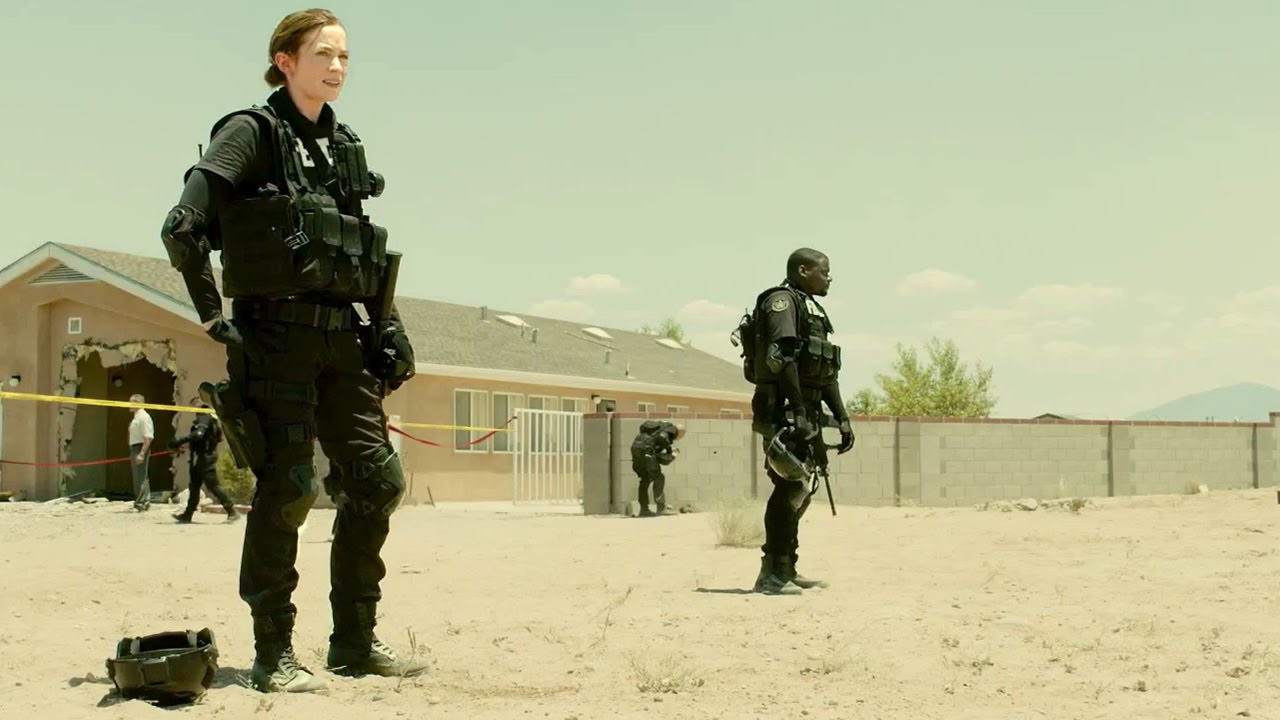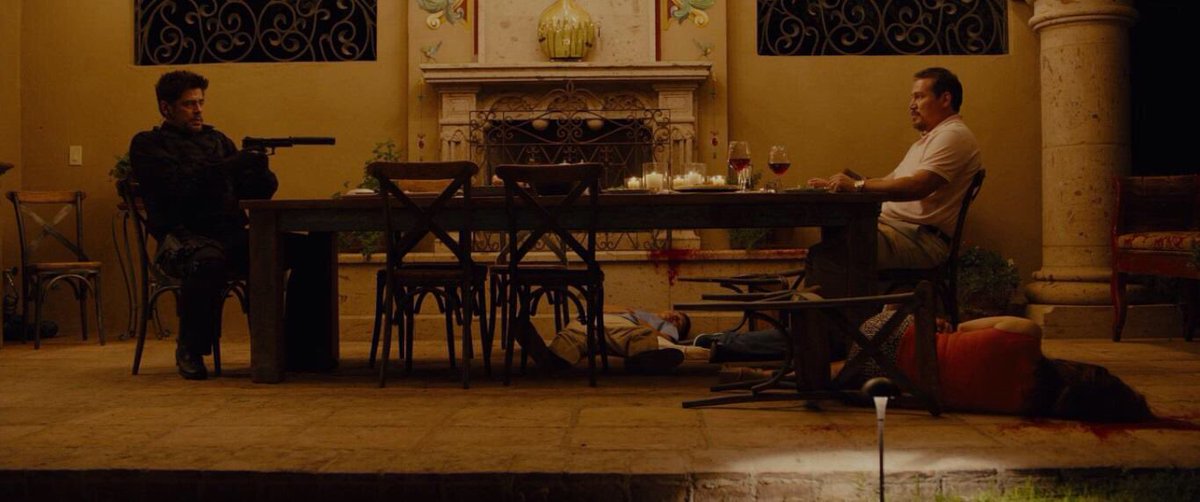In the résumé of French-Canadian filmmaker Denis Villeneuve, his 2015 offering ‘Sicario’ stands out for several reasons. Coming from a director who made intellectually explorative films like ‘Incendies’ and ‘Enemy’ before it and hard sci-fi such as ‘Arrival’ and ‘Blade Runner 2049’ after, the action-thriller does feel like a nihilistic ice bath. But the central themes of ‘Sicario’ are ethical dilemmas and moral ambiguity, both of which have been prevalent concepts in Villeneuve’s works since the very beginning of his career. SPOILERS AHEAD.
Sicario Plot Synopsis

The film opens with an FBI raid on a presumed Sonora Cartel base in Arizona, USA, led by Kate Macer (Emily Blunt) and Reggie Wayne (Daniel Kaluuya). The agents find scores of decomposing bodies stored within the walls of the safe house. Two officers trigger a booby trap, causing an explosion. Although both of them are killed, Macer, Wayne, and the rest escape with various degrees of injuries. Realizing she and her team are not making any dent in the cartel activities in the streets, Macer agrees to volunteer for a joint task force comprised of CIA agents, SFOD-D operatives, US Marshals, FBI agents, and a mysterious man named Alejandro Gillick (Benicio del Toro).
Helmed by CIA SAC/SOG officer Matt Graver (Josh Brolin), the main objective of the team is to apprehend Manuel Díaz (Bernardo Saracino), the head of the Sonora Cartel operations in the US, or at least that’s what Macer believes. But as the film progresses, she comes to realize that she has just agreed to be part of a dirty, covert, and downright criminal side of the US war on drugs and has become a pawn in a much larger game.
The Ending

‘Sicario’ poses important questions about morality and ethics throughout its entire runtime and forces its audience to choose a side between moral inaction and amoral action that brings definitive results. Macer is the point-of-view character in the film. She is a by-the-book field agent whose inherent sense of justice is overhauled by what she sees Graver, Gillick, and their men do. During her first mission with the team, they travel to Juárez, Mexico to retrieve the high-ranking Sonora Cartel member Guillermo Díaz, who is also Manuel’s brother. As they are returning, they spot a group of cartel members is about to attack them at the border crossing and gun them down. Later, Macer tries to start a legal proceeding against Manuel with the evidence of money laundering that the team finds at a bank, but her superiors in the FBI order her to stop, seeing that Graver and Gillick’s methods are clearly producing results.
It’s not like Macer doesn’t see it as well. But she desperately tries to hold onto her moral and ethical sensibilities as the other members of the joint task force commit as apathetic and reprehensible atrocities as the enemies they are fighting. She is informed that the real target has never been Manuel. The freezing of the bank accounts will result in him going back to Mexico to report to Fausto Alarcón, the enigmatic Sonora Cartel chief, and that is the man Graver and Gillick are actually after. Even when Graver tells her and Wayne that they are there only because the CIA is required by law to collaborate with domestic agencies while operating in the US soil and Wayne argues that they should just leave, she just can’t, not yet at least. As she tells Wayne, she “needs to know what they used us for.”
During the team’s raid in a tunnel used by the cartel to transport drugs into the US, Macer follows Gillick to an opening where he takes a corrupted Mexican officer (Maximiliano Hernández) as a hostage. Macer tries to stop him and points her gun at him. He retaliates by shooting at her vest. As she lies incapacitated, Gillick leaves with the Mexican officer.
Graver later tells her that she was never meant to go to that section of the tunnel and gives her an explanation about their ultimate objective. The Mexican officer earlier referred to Gillick as the “Medellín”, which leads Macer to believe that the CIA is working with Colombian drug lords, as the Medellín Cartel is the notorious crime organization that Pablo Escobar once led. Graver doesn’t necessarily refute this. Instead, he explains that as the government can’t seem to stop people from using drugs, the CIA wants to eliminate all the cartels except one, so the entire trade can be easily manageable.
As Graver tells Macer, Gillick’s reason for doing all this is pure and simple vengeance. He used to be a tax inspector and prosecutor in Juárez, Mexico until his wife and daughter were killed by the cartel. Since then, he has been working with anyone, be it the Colombians or CIA, that lets him go after the Mexican drug organizations.
In the closing scenes of the film, Gillick visits Macer and asks her to sign a statement at gunpoint declaring everything that they did was “by the book”. She had earlier threatened Graver that she would expose him. But with Gillick there, she ultimately breaks and puts her signature on the paper. Throughout the film, Villeneuve establishes a complex relationship between these two characters that, at times, can even be viewed as fledgling dynamics between a mentor and a mentee. Gillick saves her when a local corrupt cop attacks her after she brought him to her apartment and even once states that she reminds him of his late daughter. But they are so vastly dissimilar that there can be no middle ground between them. They are also at completely different stages of disillusionment with the legal system. Despite all she has experienced, there is still a flicker of idealism remains in Macer. She knows that when Gillick points his gun at her, he is very much willing to kill her. But when she later does the same, her morality and ethics again come into play and she lowers the gun.
The Attack on the Alarcón Home

In Spanish, “sicario” means an assassin or hitman, and these days, it is almost exclusively used in the context of the hired killers affiliated with Latin America-based drug cartels. However, the word has religious and historical connotations. It comes from the Hebrew word “the Sicarii”, denoting a minor branch of Jewish zealots that were prominently active in the decades leading up to the destruction of Jerusalem in 70 CE. Known as the first collective of assassins in history, their weapon of choice was a concealed dagger, which they used in their attempts to drive out the Romans and their accomplices from Judea. In the film, “sicario” obviously refers to Gillick. As Macer realizes during her conversation with Graver, the CIA doesn’t even want to arrest Alarcón but has sent Gillick to assassinate him.
After leaving Macer incapacitated, Gillick quickly catches up with Manuel. He kills the Mexican police officer who was with him and takes Manuel as a hostage instead. When they arrive at the Alarcón home, he kills Manuel and all the guards in the compound before approaching Alarcón, who is having dinner with his wife, and their two sons.
In a moment of profound cruelty, Gillick gives a false sense of assurance to Alarcón when he tells him that they should speak in English as his two sons don’t understand the language, leading him to believe that at least they will be spared. In the conversation that follows, there is a reference to Gillick’s current employer. The way Alarcón frames the sentence, it can either mean the Colombians or the CIA, but considering the circumstances, especially with the US surveillance team providing Gillick with remote backup, Alarcón is likely talking about the latter.
Alarcón is so confident that Gillick, once a proud and respectable lawyer, will not do anything to hurt his children that he asks him not to kill him before them. Gillick responds in Spanish, “Time to meet God”, so that the two children will understand it as well, before killing them and their mother. In Gillick’s morally vacant world, vengeance can only be attained by making the culprit pay the full price. He kills Alarcón’s sons and wife before him, lets him feel the insurmountable grief that he himself has been feeling all this while, even if it’s for a few moments, and then shoots him dead.
Read More: Where Was Sicario Filmed?

You must be logged in to post a comment.